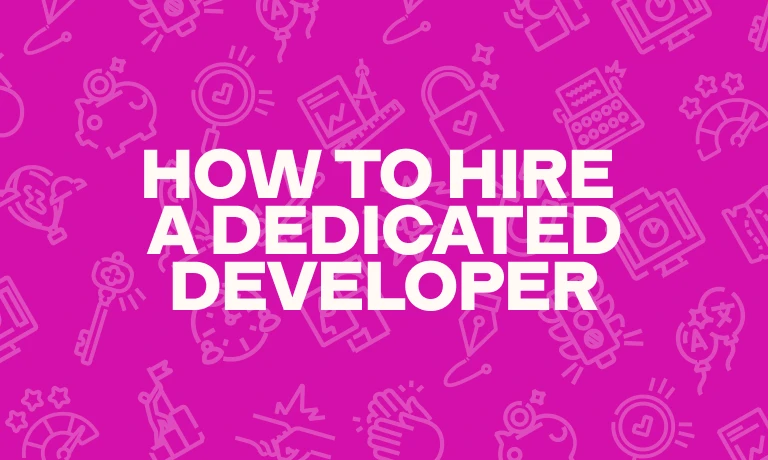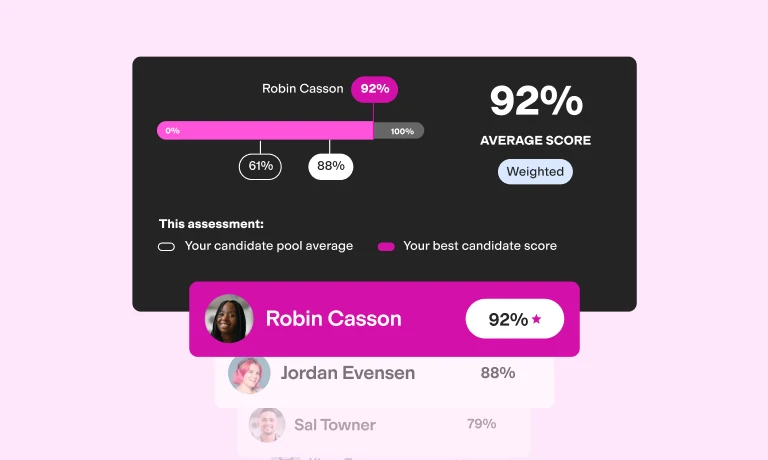Top cloud system administrator interview questions, according to experts
System downtime costs money. Security gaps ruin professional reputations. And cloud system administrator mis-hires? They contribute to both issues.
One avoidable problem companies make when hiring cloud system admins is asking candidates overused interview questions that invite memorized answers. These won’t give you a solid understanding of someone’s true abilities when it comes to downtime, security, and more. Stronger questions focus on past or hypothetical scenarios and cover topics that are important to today – from crisis management to performance optimization under resource constraints.
We spoke to industry leaders to compile various interview questions for cloud system administrators. Find these questions below – plus, check out how our Cloud System Administration test can enhance your interview process.
The cloud has evolved, but your questions haven’t
The cloud is constantly evolving. But, many cloud system administration interview questions have failed to keep pace, with questions that test memory, not mastery, and reward surface knowledge over real-world judgment.
Consider these questions:
What systems do you have experience with?
What cloud projects are you most proud of?
What's your process when there’s an outage?
On the surface, these questions seem fine. They’re familiar, succinct, and get the ball rolling on casual conversation. But, what are they really telling you? How well someone sells their story, or regurgitates a rehearsed answer?
That’s not enough.
You need to know the right questions to ask (and the proper way to assess cloud system administrator skills).
Topics the experts cover, questions they ask, and what they look for in answers
We’ve spoken to industry experts and hiring managers who gave us the low-down on what to ask, skills to look for, and how they spot genuine skill.
Here are the key topics they covered, plus some great questions to ask.
Crisis management
Suhail Patel, Director of Dustro, says, “I’ve spent years building and leading tech teams, and a big part of that is hiring the right Cloud/System Administrators. The best hires I’ve made were the ones who could stay calm when the lights went out.”
Try asking the following questions to measure how candidates think and behave under pressure.
Talk to me about a time you had to manage a live outage. What happened, and how did you resolve it?
This is one of Patel’s favorite questions. He says, “I can tell everything about a candidate by the way they respond. It's a warning sign if they immediately launch into buzzwords or tools. I want to know how they handled the upheaval, how they made decisions under pressure, and how they struck a balance between short-term stability and long-term solutions.”
The best answers will describe the context of the outage, how they coordinated with stakeholders or other teams, and the actions that led to resolution.
Don’t hesitate to make the question more specific. For instance, you might ask specifically about P1 incidents. Since such incidents compromise data integrity, pose financial risks, or cause significant customer downtime, this question will assess how candidates deal with more extreme pressure.
Sergio Oliveira, Chief Technology Officer at DesignRush, prefers scenario-based questions for avoiding rehearsed answers, saying that, “Scenario-based questions are the most effective. Interruptions, scaling, or security issues rarely have clear-cut answers.”
A critical application goes down during peak hours, and you’re the first person alerted. What do you do in the first five minutes?
This question comes from Sergio Oliveira, Chief Technology Officer at DesignRush. While it’s similar to the question above, it has a slightly different focus: It zeroes in on how candidates prioritize actions right when the outage happens.
Sergio explains, “This quickly shows me how they prioritize, communicate, and troubleshoot. Strong candidates focus on gathering information and stabilizing the situation before jumping to fixes.”
Performance optimization under resource constraints
John Overton, CEO and founder of Kove IO (a company pioneering software-defined memory to allow distributed memory pooling), believes that “Performance optimization under real constraints separates good from great.”
When cloud systems grow, administrators often face hard trade-offs: memory limits, cost ceilings, workload spikes, etc. Good interview questions assess whether candidates can think at a system level and find practical ways to keep systems running when resources are limited.
Here are some questions you might ask:
Tell me about a time a system you managed hit resource limits and you had to find a workaround without extra budget. How’d you approach i
Strong answers to this question should demonstrate how candidates prioritized fixes and balanced system stability with cost control.
You can make this question more specific to your environment or scale. For instance, if you’re running larger or more complex systems, you might ask how candidates plan for sudden spikes in demand or limited resources.
John, for example, says, “Been hiring cloud admins for years at Kove and I've learned the most revealing question is ‘Describe how you'd handle memory allocation when you have a 60-day AI training job that suddenly needs 10x more resources.’ This immediately shows whether they think in terms of dynamic provisioning versus static resource allocation.”
You’re managing an application in [INSERT CLOUD PLATFORM]. It’s slowing down and costs are rising. How would you decide which tools or services to adjust, replace, or add to improve performance and efficiency?”
This question was crafted with Sergio’s guidance and can be adapted to suit your needs.
Sergio says, “I always ask about tools in context. It is easy to say, ‘I would scale up an EC2 instance,” but I want to know why. The best answers include cost, security, and business impact. This shows me the candidate is not just a tool operator but a systems thinker who connects technical work with the bigger picture.”
Stakeholder management
Stakeholder management is a critical element of cloud system administration. If cloud system admins can’t convince project stakeholders of the importance of their work, what hope do they have of convincing non-technical business leaders or executives that cloud safety is a growth driver?
Here’s a question you might ask:
Imagine you’re recommending a new infrastructure solution. How would you explain to a CFO why we need [INSERT OPTION A] instead of [INSERT OPTION B]?
This question can be adapted to suit your needs.
For example, John Overton asks his candidates, “How would you explain to the CFO why we need software-defined memory instead of just buying bigger servers?” He says that the best candidates talk about measurable business outcomes – like energy savings, hardware efficiency, or reduced operational costs. Those candidates “understand that cloud infrastructure decisions are ultimately financial decisions.”
Security and agility
Describe a situation where you had to balance security requirements with a team’s need for agility. How’d you reach a compromise?
Balancing speed and security is one of the most common and challenging tasks in cloud system administration. Candidates should be able to demonstrate how they assessed the risks, understood the business need for speed, and found a pragmatic solution that satisfied both sides.
It’s also important to note that cloud security can’t be a bolt-on. According to the article, “Balancing security and agility in the cloud”:
“Old-school information security checklists and sit-down security reviews don’t work in an era of agile development. ‘That approach worked when you were doing waterfall development and had six to nine months to deliver a program,’ says Steve George, EY Global Chief Information Officer. ‘But now, with the advent of agile development and cloud, two weeks can be the whole project. You have to step back and think about security in a new way.’”
Topical expertise
While asking genuinely insightful questions is important, you might still want to assess some routine cloud computing knowledge to ensure a candidate can hit the ground running.
But, as mentioned above, questions meant to assess topical expertise are often rehearsable and fudgeable.
The key? Pepper your textbook questions with a healthy dose of real-world context. This will uncover how candidates apply their knowledge.
Instead of asking… | Ask… | Here’s why: |
What are the main differences between IaaS, PaaS, and SaaS? | Our company is migrating part of its on-premises workload to the cloud. How would you decide whether to use IaaS, PaaS, or Saas? What system strengths or trade-offs would you consider? | It forces them to provide examples of trade-offs (like how the customization of IaaS outweighs the simplicity of Saas). It also shows how well they can use their knowledge to make decisions. |
What are some key considerations when choosing a cloud provider? | You’re evaluating several cloud providers for our company, which [DESCRIBE COMPANY CONSTRAINTS OR GOALS]. How would you decide which one best fits our needs? | It forces them to reveal their key considerations – including cost, availability, ease of integration, vendor support, and compliance. Plus, it shows how they balance technical requirements with business goals when evaluating providers. |
What are some common cloud threats? | Describe a time you identified or mitigated a cloud security risk. How’d you detect it, and what steps did you take to prevent it from recurring? | This transforms a generic security prompt into a real test of real-world knowledge and applied judgment. Candidates must apply their knowledge of insecure APIs, access controls, data breaches, insider threats, compliance risks, and denial-of-service attacks to specific scenarios and explain their prevention and mitigation methods. |
How do you stay up to date with the latest cloud technologies? | What’s a recent change or innovation in [INSERT CLOUD PLATFORM] that you’ve adopted or adapted to improve performance or security? How did you learn about it? | Maintaining industry knowledge is essential in a fast-moving space like cloud infrastructure, where providers roll out new services and features constantly. The transformed question assesses continuous learning in context and shows how candidates apply new developments to real systems. |
Pro tip: Use interview score cards to evaluate your interviewees fairly.
The best insights on HR and recruitment, delivered to your inbox.
Biweekly updates. No spam. Unsubscribe any time.
Where do interview questions fit into your hiring process?
A good selection process should pre-screen candidates before picking ones to interview. This way, you won’t waste time interviewing cloud system admins who won’t work out (and you won't waste their time, either).
A talent discovery platform like TestGorilla can help you find candidates with the skills you need right away.
Our Cloud System Administrator test is perfect for this. It assesses crucial skills like Windows and Linux system administration, AWS/Azure cloud, and networking.
You can pair this test with up to four other tests to create the perfect assessment. Some tests you might use include:
You can also edit any pre-existing test questions or create your own for a truly custom assessment.
TestGorilla’s platform automatically scores test results and benchmarks candidates against one another, highlighting top performers you can shortlist for your interview. Then, your interviews can be a deeper exploration of how candidates really think and communicate.
To learn more about our platform and hire a cloud system administrator who can truly deliver, sign up for a free TestGorilla account today or try out a free demo.
Contributors
John Overton, CEO and founder of Kove IO
Suhail Patel, Director of Dustro
Sergio Oliveira, Chief Technology Officer at DesignRush
Related posts
You've scrolled this far
Why not try TestGorilla for free, and see what happens when you put skills first.


















